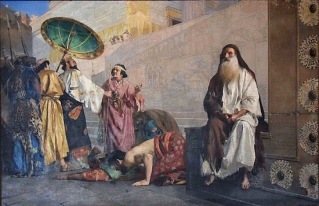Matthew 19:13-14: People Like These
Thursday, December 14, 2023
This week we explore how to put our love on the line just as the Creator does by abiding with us, just as Jesus does as he shows us The Way, and just as the Spirit does as she comforts and remains in us.
One day children were brought to Jesus in the hope that he would lay hands on them and pray over them. The disciples shooed them off. But Jesus intervened: “Let the children alone, don’t prevent them from coming to me. God’s kingdom is made up of people like these.” After laying hands on them, he left. (MSG)
Can we imagine a world that is full of people who are as innocent as the children we read about today? If not, we might ask the Creator to unharden our hearts so that we might be people like these.
Some people brought children to Jesus for him to place his hands on them and to pray for them, but the disciples scolded the people. Jesus said, “Let the children come to me and do not stop them, because the Kingdom of heaven belongs to such as these.” (GNT)
Can we imagine a world that is full of people who are as trusting as the children we read about today? If not, we might ask Jesus to inspire us with his own example of trust in the Creator so that we might be people like these.
Then children were brought to him so that he might lay his hands on them and pray for them, but the talmidim rebuked the people bringing them. However, Yeshua said, “Let the children come to me, don’t stop them, for the Kingdom of Heaven belongs to such as these.” (CJB)
Can we imagine a world that is full of people who are as loving as the children we read about today? If not, we might ask the Spirit to fill us with the hope and love of Advent so that we might be people like these.
When we explore various translations of these verses, we discover God’s that in God’s plan there is an absolute necessity for each of us to rely on the Creator, Christ and Spirit just as these children we see today.
Image from: https://commons.wikimedia.org/wiki/File:ChristwithChildren_CarlBloch.jpg

















